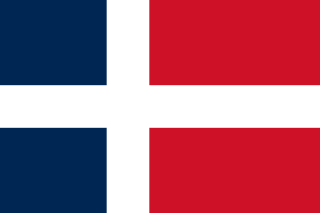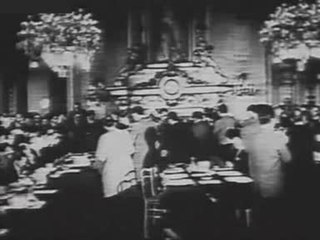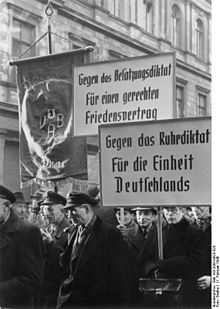
Konrad Hermann Joseph Adenauer was a German statesman who served as the first chancellor of the Federal Republic of Germany from 1949 to 1963. From 1946 to 1966, he was the first leader of the Christian Democratic Union (CDU), a newly founded Christian-democratic party, which became the dominant force in the country under his leadership.

West Germany is the common English name for the Federal Republic of Germany from its formation on 23 May 1949 until its reunification with East Germany on 3 October 1990. It is sometimes known as the Bonn Republic after its capital city of Bonn. During the Cold War, the western portion of Germany and the associated territory of West Berlin were parts of the Western Bloc. West Germany was formed as a political entity during the Allied occupation of Germany after World War II, established from 12 states formed in the three Allied zones of occupation held by the United States, the United Kingdom, and France.

The Hallstein Doctrine, named after Walter Hallstein, was a key principle in the foreign policy of the Federal Republic of Germany from 1955 to 1970. As usually presented, it prescribed that the Federal Republic would not establish or maintain diplomatic relations with any state that recognized the German Democratic Republic. In fact it was more nuanced. There was no public official text of the "doctrine", but its main architect, Wilhelm Grewe, explained it publicly in a radio interview. Konrad Adenauer, who served as Chancellor of Germany from 1949 to 1963, explained the outlines of the policy in a statement to the German parliament on 22 September 1955. It meant that the Federal German government would regard it as an unfriendly act if third countries were to recognize the "German Democratic Republic" or to maintain diplomatic relations with it – with the exception of the Soviet Union. The West German response to such could mean breaking off diplomatic relations, though this was not stated as an automatic response under the policy and in fact remained the ultima ratio.

The Basic Law for the Federal Republic of Germany is the constitution of the Federal Republic of Germany.

Walter Hallstein was a German academic, diplomat and statesman who was the first president of the Commission of the European Economic Community and one of the founding fathers of the European Union.

The history of Germany from 1945 to 1990 comprises the period following World War II. The period began with the Berlin Declaration, marking the abolition of the German Reich and Allied-occupied period in Germany on 5 June 1945, and ended with the German reunification on 3 October 1990.

The Austrian State Treaty or Austrian Independence Treaty established Austria as a sovereign state. It was signed on 15 May 1955 in Vienna, at the Schloss Belvedere among the Allied occupying powers and the Austrian government. The neighbouring Federal People's Republic of Yugoslavia acceded to the treaty subsequently. It officially came into force on 27 July 1955.

Federal elections were held in West Germany on 14 August 1949 to elect the members of the first Bundestag, with a further eight seats elected in West Berlin between 1949 and January 1952 and another eleven between February 1952 and 1953. They were the first free federal elections in West Germany since 1933 and the first after the division of the country.

The Saar Protectorate, officially Saarland, was a French protectorate and a disputed territory separated from Germany. On joining the Federal Republic of Germany in 1957, it became the smallest "federal state", the Saarland, not counting the "city states" of Berlin, Hamburg, and Bremen. It is named after the Saar River.

The Schuman Declaration, or Schuman Plan, was a proposal to place French and West German production of coal and steel under a single authority that later became the European Coal and Steel Community, made by the French foreign minister, Robert Schuman, on 9 May 1950, the day after the fifth anniversary of the end of World War II in Europe. The alliance would later be opened to other European countries. The ultimate goal was to pacify relations, especially between France and West Germany, through gradual political integration to be achieved by creating common interests. Schuman said that "[t]he coming together of the countries of Europe requires the elimination of the age-old opposition of France and Germany ... the solidarity in production thus established will make it plain that any war between France and Germany becomes not merely unthinkable, but materially impossible."

The entirety of Germany was occupied and administered by the Allies of World War II, from the Berlin Declaration on 5 June 1945 to the establishment of West Germany on 23 May 1949. Unlike occupied Japan, Nazi Germany was stripped of its sovereignty and former state: after Germany formally surrendered on 8 May 1945, the four countries representing the Allies asserted joint authority and sovereignty through the Allied Control Council (ACC).

The Petersberg Agreement is an international treaty that extended the rights of the government of West Germany vis-a-vis the occupying forces of the United Kingdom, France, and the United States. It is viewed as the first major step of West Germany towards sovereignty. It was signed by West German Chancellor Konrad Adenauer and Allied High Commissioners Brian Hubert Robertson, André François-Poncet (France), and John J. McCloy on 22 November 1949. The Hotel Petersberg, near Bonn, was the seat of the High Commissioners and the place of signature. The agreement was the first modification of the Occupation Statute.

The Allied High Commission was established by the United States, the United Kingdom, and France after the 1948 breakdown of the Allied Control Council, to regulate and supervise the development of the newly established Federal Republic of Germany.

Hotel Petersberg is a hotel and official guest house of Germany, termed the "Bundesgästehaus". It is located on the Petersberg, a prominent mountain of the Siebengebirge near Bonn, Germany. With a height of 331 metres (1,086 ft), it overlooks the cities of Königswinter, on the right bank of the Rhine river, and Bonn on the opposite side.
An exclusive mandate is a government's assertion of its legitimate authority over a certain territory, part of which another government controls with stable, de facto sovereignty. It is also known as a claim to sole representation or an exclusive authority claim. The concept was particularly important during the Cold War period when a number of states were divided on ideological grounds.

The Bonn–Paris conventions were signed in May 1952 and came into force after the 1955 ratification. The conventions put an end to the Allied occupation of West Germany.
The legal status of Germany concerns the question of the extinction, or otherwise continuation, of the German nation-state following the rise and downfall of Nazi Germany, and constitutional hiatus of the military occupation of Germany by the four Allied powers from 1945 to 1949. It became current once again when the German Democratic Republic joined the Federal Republic of Germany in 1990.

The London and Paris Conferences were two related conferences held in London and Paris during September–October 1954 to determine the status of West Germany. The talks concluded with the signing of the Paris Agreements, which granted West Germany some sovereignty, ended the occupation, and allowed its admittance to NATO. Furthermore, both West Germany and Italy joined the Brussels Treaty on 23 October 1954. The Agreements went into force on 5 May 1955. The participating powers included France, the United Kingdom, Belgium, the Netherlands, Luxembourg, West Germany, Italy, Canada, the United States, and remaining NATO members.

The Allied Control Council (ACC) or Allied Control Authority, and also referred to as the Four Powers, was the governing body of the Allied occupation zones in Germany (1945–1949/1991) and Austria (1945–1955) after the end of World War II in Europe. After the defeat of the Nazis, Germany and Austria were occupied as two different areas, both by the same four Allies. Both were later divided into four zones by the 1 August 1945 Potsdam Agreement. Its members were the Soviet Union, the United Kingdom, the United States, and France. The organisation was based in Schöneberg, Berlin.

Heinrich Joseph Maximilian Johann Maria von Brentano di Tremezzo, known professionally as Heinrich von Brentano, was a German politician of the Christian Democratic Union (CDU). He served as Federal Minister for Foreign Affairs from 1955 to 1961.














